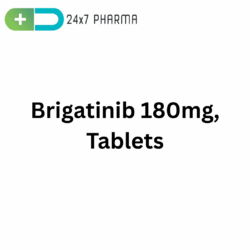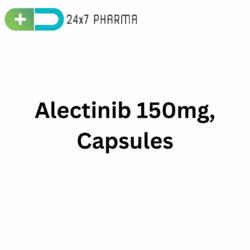LuciRepo 40mg, Repotrectinib Capsules
LuciRepo 40mg contains Repotrectinib, an advanced targeted therapy designed to treat specific types of cancer with genetic alterations. As precision medicine evolves, Repotrectinib offers hope to patients whose tumors exhibit particular mutations. This drug is especially relevant in non-small cell lung cancer (NSCLC) with ROS1 rearrangements and NTRK gene fusions. LuciRepo, produced as oral capsules, marks a milestone in the treatment of genetically-driven tumors.
What is LuciRepo 40mg (Repotrectinib)?
LuciRepo 40mg is a tyrosine kinase inhibitor (TKI) formulation of Repotrectinib. It is used to treat adult patients with solid tumors that have ROS1-positive NSCLC or NTRK gene fusion-positive cancers, including those who may have previously received other treatments. Repotrectinib is particularly potent against tumors with acquired resistance to prior TRK or ROS1 inhibitors.
How it Works / Mechanism of Action
Repotrectinib functions by selectively inhibiting tyrosine kinases, including:
- ROS1 (c-ros oncogene 1)
- TRKA, TRKB, and TRKC (tropomyosin receptor kinases encoded by NTRK1, NTRK2, NTRK3)
These kinases, when abnormally activated by gene fusions, drive cancer progression by promoting uncontrolled cell proliferation. Repotrectinib binds to these fusion kinases and blocks signaling pathways such as:
- PI3K/AKT
- RAS/MAPK
- JAK/STAT
By doing so, it halts tumor growth and may induce tumor regression. Its compact molecular structure allows it to penetrate the blood-brain barrier, making it useful in cases with brain metastases.
How to Use / Indications
LuciRepo (Repotrectinib) is indicated for:
- Adult patients with non-small cell lung cancer (NSCLC) that is ROS1-positive.
- Solid tumors with NTRK gene fusion in adults and children aged 12 and up:
- Who have no satisfactory alternative therapy.
- Who have progressed after prior therapy.
- These indications are often determined after molecular testing confirms the genetic mutations (ROS1 or NTRK fusions).
How to Take / Dosage
Recommended Dosage for Adults:
- Initiation Phase (14 days): 160 mg orally once daily
- Maintenance Phase (after Day 14): 160 mg twice daily (BID)
- Capsules should be swallowed whole, with or without food. Do not crush, chew, or open the capsules.
Other Dosage Information
Body surface area (BSA) is the basis for the pediatric dosage (12 years and older).
Renal Impairment: Mild to moderate impairment does not require changing the dosage.
- Hepatic Impairment: Monitor closely in moderate to severe liver disease.
- Missed Dose: Take the missed dose as soon as possible on the same day; skip if it’s almost time for the next dose.
Side Effects
Common Side Effects:
- Dizziness
- Fatigue
- Constipation
- Dysgeusia (altered taste)
- Nausea
- Headache
- Anemia
- Weight gain
Serious Side Effects:
- CNS effects: Risk of dizziness and loss of balance due to CNS penetration
- QT prolongation: May affect heart rhythm—requires ECG monitoring
- Hepatotoxicity: Elevated liver enzymes (ALT, AST)
- Pneumonitis: Non-infectious lung inflammation
- Neurotoxicity: Cognitive and motor disturbances
- Immediate medical attention is needed for severe dizziness, chest pain, breathing difficulty, or confusion.
Storage
- Store at room temperature (20°C to 25°C)
- Protect from moisture and light
- Keep in original container
- Keep out of reach of children
- Do not use after the expiration date indicated on the packaging.
Benefits
- Effective in resistant cancers: Works even after resistance to other TKIs like crizotinib or entrectinib.
- Brain metastases coverage: Crosses blood-brain barrier to treat intracranial tumors.
- Oral administration: Convenient daily capsule dosing.
- Precision medicine: Tailored to genetic mutations, offering targeted and often more effective treatment.
Prescription
- LuciRepo is a prescription-only medication.
- It can only be prescribed by oncologists or doctors who have support from genetic testing.
- Requires confirmation of ROS1 or NTRK fusion via laboratory tests such as next-generation sequencing (NGS).
Drug Interactions
- CYP3A inhibitors (e.g., ketoconazole): May increase Repotrectinib levels—monitor for toxicity.
- CYP3A inducers (e.g., rifampin): May decrease Repotrectinib effectiveness—avoid if possible.
- QT-prolonging agents (e.g., amiodarone): Risk of arrhythmia increases.
- Antacids, H2 blockers, PPIs: May reduce absorption—administer at staggered times.
- Patients should inform their doctor about all medications, including herbal products and supplements.
FAQs
Can I drive after taking it?
Caution is advised as it can cause dizziness and balance issues.
Does it work if previous ROS1 or NTRK treatments failed?
Yes. It’s designed to overcome resistance to other TKIs.
How soon can results be seen?
Response may vary; tumor shrinkage may be seen within weeks but is usually assessed after a few months.
Conclusion
LuciRepo 40mg (Repotrectinib) represents a major step forward in personalized oncology treatment. It offers a potent, selective, and brain-penetrant therapy for patients with ROS1-positive or NTRK fusion-positive tumors, especially those who have exhausted prior treatment options. With manageable side effects and oral dosing, it combines convenience with clinical efficacy. As personalized medicine continues to evolve, LuciRepo stands at the forefront of targeted cancer therapies, bringing new hope to complex and resistant cases.









